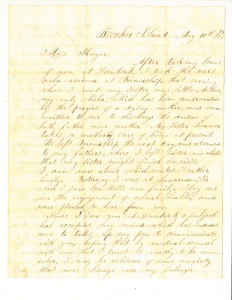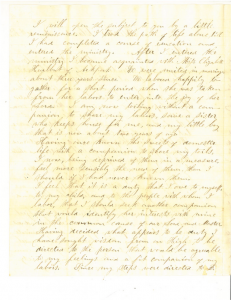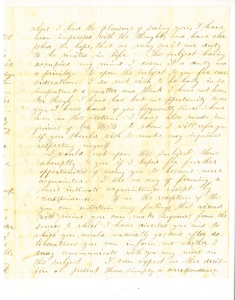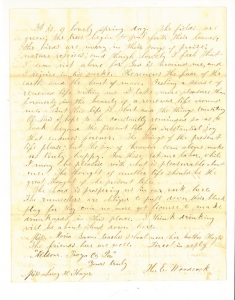Author: Henry E. Woodcock
Recipient: Lucy H. Thayer
Date: 10 May 1853
Location: Henry Edwin Woodcock Papers, Record Group 30/81, Series 1. Correspondence, Oberlin College Archives
Document Type: Autograph Letter, Signed by Author
Introduction:
This letter was written by Henry Woodcock immediately after his first meeting with Lucy Thayer, and contains his proposal that they engage in a correspondence that will lead them to marriage. Henry describes the roles of husband and wife as duties to be performed for Christ and the good of others, rather than specifically because of love. Indeed, he uses the word “duty” to describe potential nuptials and parenting no less than five times in this epistle. Also pay attention to the end of the third paragraph and the gendered assumptions inherent in the way that Henry states a woman would naturally seek the advice of a man, specifically her father, on a potential courtship.
 Beecher Island1 May 10th 1853
Beecher Island1 May 10th 1853
Miss Thayer,
After taking leave of you at Dunkirk,2 I took the cars and arrived at Friendship3 that evening where I met my sister and little Arthur, my only child, which has been consecrated by the prayers of a dying mother, and committed to me to discharge the duties of both father and mother. My sister however takes a motherly care of him at present. We left Friendship the next day, and returned to my fathers [sic],4 where I left sister and child that my sister might finish her visit. I am now alone which makes it rather lonely. Yesterday I was at Lawrenceville5 where I saw bro. Wells6 and family. They are in the enjoyment of usual  health, and were pleased to hear from you.
health, and were pleased to hear from you.
Since I saw you at Dunkirk, a subject has occupied my mind which has induced me to take up my pen to communicate with you, hoping that by mutual counsel with one that I trust is worthy to be counseled, I may be relieved of some anxiety that now hangs over my feelings.
I will open the subject to you by a little reminiscence. I trod the path of life alone till I had completed a course of education and entered the ministry. After I entered the ministry I became acquainted with Miss. Elizabeth Hurlbut of Arkport.7 We were united in marriage about three years since. We labored happily together for a short period when she was taken from her labors  to enter into the joy of her Lord.8 I am now toiling without a companion to share my labors, save a sister who keeps house for me, and my little boy that is now about two years of age.
to enter into the joy of her Lord.8 I am now toiling without a companion to share my labors, save a sister who keeps house for me, and my little boy that is now about two years of age.
Having once known the sweets of domestic life with a companion to share my toils, I now, being deprived of them in a measure, feel more sensibly the need of them, than I should if I had never known them. I feel that it is a duty that I owe to myself, to my child, and to the people with whom I labor, that I should seek another companion that would identify her interests with mine in the common cause of our Lord and Master. Having decided what appears to be duty I have sought wisdom from on High to be directed to the person that would be agreeable to my feelings and a fit companion of my labors.  Since my steps were directed to D.9 where I had the pleasure of seeing you, I have been impressed with the thought, and have cherished the hope, that we may see it our duty to be united in life. This subject having occupied my mind I deem it a duty and a privilege to open the subject to you for consideration. I do not wish to be hasty in so important a matter and think I have not been. For, though I have had but one opportunity to see you, I have heard of you frequently since I have been in this section. I have also made inquiries to bro. Wells to whom I will refer you if should you wish to make any inquiries respecting myself
Since my steps were directed to D.9 where I had the pleasure of seeing you, I have been impressed with the thought, and have cherished the hope, that we may see it our duty to be united in life. This subject having occupied my mind I deem it a duty and a privilege to open the subject to you for consideration. I do not wish to be hasty in so important a matter and think I have not been. For, though I have had but one opportunity to see you, I have heard of you frequently since I have been in this section. I have also made inquiries to bro. Wells to whom I will refer you if should you wish to make any inquiries respecting myself
I would not open this subject this abruptly to you if I hoped for further opportunities of seeing you to become more acquainted. I see no way of forming a more intimate acquaintance except by correspondence.10 If on the reception of this you can entertain any feelings that accord with mine you can make inquiries from the source to which I have directed you and to which you would naturally go; and after deliberation you can inform me whether I may communicate with you any more on this subject. I can expect no other decision at present than simply a correspondence.
It is a lovely spring day. The fields are green; the trees begin to put forth their leaves; the birds are merry in their songs of praise; nature rejoices; and though lonely I feel that I am not alone for God is around me, and I rejoice in his works. He renews the face of the earth and the heart of man. Feeling a sense of renewed life within me I take more pleasure than formerly in the beauty of a renewed life around me. But this life is short and the things transitory. Of this I hope to be constantly reminded so as to look beyond the present life for substantial joy that endures forever. The things of the present life please; but the joy of heaven can alone make us truly happy. For these let me labor, while I may be pleased with what is pleasurable about me. The thought of another life should be the great thought of the present life.
The Lord is prospering us in our work here. The rumsellers [sic] are obliged to pull down their black flag for they can no more get license to make drunkards in this place. I think drinking will be about short down here.11
Miss. Maria Bacon12 teaches school near her brother Hoyts. The friends here are well. Direct in reply
“Nelson13 Tioga Co. Pa.”
Yours Truly
H.E. Woodcock
Miss Lucy H. Thayer.
Transcribed by Rachel Sacks.
1Beecher’s Island, later called Nelson, is located in Tioga County, Pennsylvania. At the time of this letter, Henry Woodcock was preaching in the First Presbyterian Church of Beecher’s Island and from his letters and autobiography, apparently also preached at several other churches in the area, traveling between them so that he would preach at one church in the morning, one in the afternoon, and one in the evening. This is likely due to the fact that Tioga county was sparsely populated at the time, with an average of only 21.1 people per square mile (in comparison, Lorain County, where Oberlin is located, had 52.7 people per square mile for the same census year), and it seems unlikely that a large central church could have served the whole area effectively (Oberlin College Archives, The Henry Edwin Woodcock Papers. 1987/67. 1989/141. RG 30/81; “Social Explorer: Population Density Per Square Mile, Census 1850.” web address, accessed 29 June 2015).
2Dunkirk is in Chautauqua County, New York, on the shore of Lake Erie. Lucy Thayer had relocated there from Pennsylvania a few months earlier when she was asked to teach at a school in the region. (Oberlin College Archives, The Henry Edwin Woodcock Papers)
3The town of Friendship is in Allegany County, New York. Friendship is approximately halfway between Dunkirk, New York and Nelson, Pennsylvania.
4From the context of this letter, it appears that Henry’s father was still living in Independence, New York.
5Lawrenceville is another town in Tioga County. This is where Lucy Thayer had previously lived with her adopted family (Oberlin College Archives, The Henry Edwin Woodcock Papers).
6Brother Wells is the Reverend E.D. Wells. He and his wife Henrietta (Hattie) Wells, were childless and obtained permission from Lucy Thayer’s parents to adopt her when she was eleven. Rev. Wells was a Presbyterian minister and served in the Tioga County region for a number of years. He also served at the First Presbyterian Church of Beecher’s Island, where Henry worked, and was instrumental in the latter’s receiving the pastorate in the region after they became friends at a meeting of the Evangelic Alliance a few years earlier. As late as 1872, Wells remained in Lawrenceville, Pennsylvania, where the records of the Harrisburg Presbyterian Synod show he was still active in the ministry of the Beecher’s Island Church, as well as a member of the Wellsboro Presbytery’s permanent committees for both Home and Foreign Missions (Oberlin College Archives, The Henry Edwin Woodcock Papers; Presbyterian Church in the U.S.A. Synods. Minutes of the Annual Session. Vol. 2 Pennsylvania State University, 1871).
7Arkport is located in Steuben County, New York.
8Elizabeth Hurlbut was his first wife, with whom he became acquainted after meeting her relatives at a funeral for one of his parishioners. They were married on 11 June 1850 and had one child, Arthur Woodcock. According to Henry’s autobiography, Elizabeth died on 23 May 1852 in Arkport of an infection of the “messenary gland” following a severe battle with pneumonia. She and Henry both recognized her illness was fatal and they were able to spend the last six weeks of her life together. Her death appears to have made a distinct impression on Henry, as even close to a half century later in his autobiography, he described her death with great detail. (Oberlin College Archives, The Henry Edwin Woodcock Papers).
9Dunkirk, New York.
10The distance between Henry and Lucy’s homes (of Beecher’s Island and Dunkirk respectively) at this time would have been a great one, approximately 132 miles, and required extensive travel. Therefore, though they were able to see each other occasionally, the majority of their courtship was conducted entirely through their letters.
11Throughout most of his life, Henry Woodcock was heavily involved in the temperance movement, often getting into arguments-verbal, legal, and physical- with tavern owners and patrons. In several cases, during his time preaching in New York, his insistence on the subject forced him to move churches. Later in his life, he seems to have had more success, as he describes in his autobiography a series of incidents in Tonganoxie, Kansas, which resulted in his removing all illegal saloon keepers from the now “dry” town. At the time of this letter, Pennsylvania was still a few years away from statewide temperance legislation. Instead, temperance legislation was a local matter, and often complicated to enforce (Oberlin College Archives, The Henry Edwin Woodcock Papers; Tyrrell, Ian R. Sobering Up :From Temperance to Prohibition in Antebellum America, 1800-1860. Contributions in American History ; no. 82. Westport, Conn.: Greenwood Press, 1979).
12Likely a friend of Lucy Thayer’s.
13Nelson, in this case, refers to the same place as Beecher’s Island. It was the name of the township in which Beecher’s Island was incorporated, and a later official name for the town of Beecher’s Island itself (Joyce M. Tice, “Tri-Counties Genealogy and History by Joyce M. Tice.” web address, accessed 06/22, 2015).